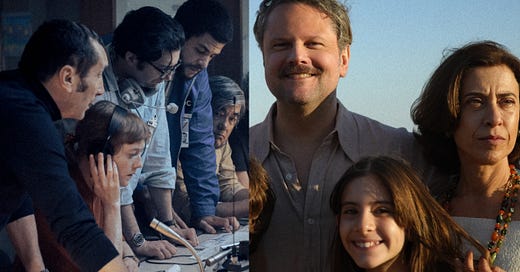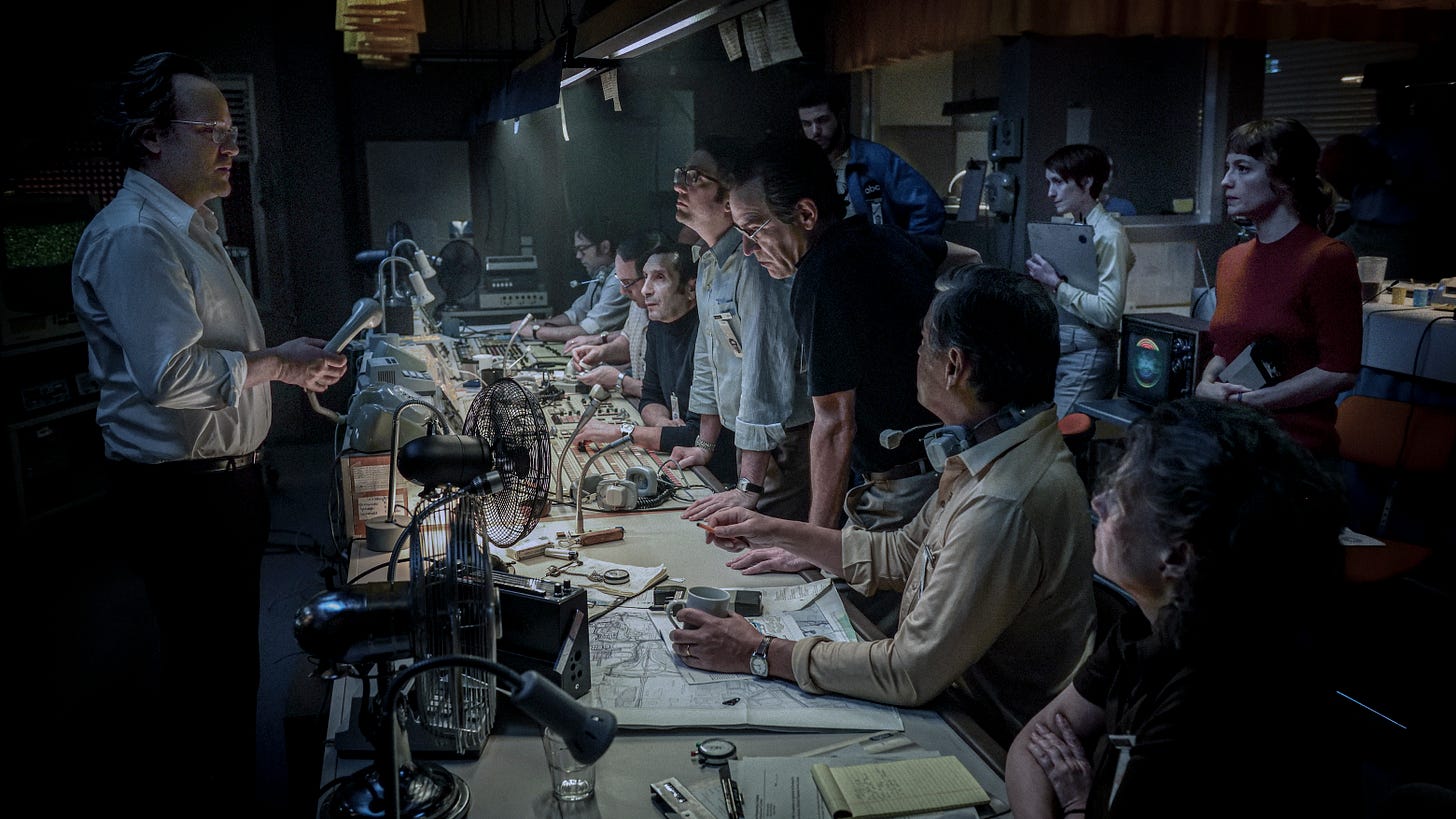Stories We Tell (and Don't)
Reviews of I’m Still Here and September 5, plus final update to Oscar predictions.
What a filmmaker chooses to include and exclude from their stories can make a huge impact in how they are received. Both I’m Still Here and September 5 are centered on tragic events that occurred in the 70s, with unsettling parallels to the present. But while one has been widely celebrated for telling the story of a woman standing up to Brazil’s military dictatorship, the other’s accidental pertinence to the current conflict in Gaza has sparked some controversy.
After those two reviews are a roundup of some other films you can see in theaters, and a final update to my Oscar nomination predictions!
I’m Still Here (Ainda Estou Aqui)
Opened January 17 in New York & LA, expands nationwide February 7.
Although this emotional Brazilian drama is handsomely crafted, it becomes overly conventional after its first act. The opening immerses us in a relatively idyllic family life, one about to be irrevocably disrupted. It’s 1970, and the country is in the grip of a military dictatorship when former congressman Rubens Paiva (Selton Mello) returns to Brazil after six years of self-imposed exile. Reunited with his wife Eunice (Fernanda Torres) and his five children, he tries to stay out of politics and works as a civil engineer. Though the family seems to enjoy a semi-charmed life, the opening scenes suggest otherwise: Eunice floats peacefully in the ocean as a military helicopter flies overhead; her daughter is frivolously detained at an army checkpoint for several hours. Rubens engages in furtive political discussions with his friends, keeping his wife in the dark. Perhaps this bourgeois family believes they can live through this dictatorship relatively unaffected by openly taking a side.
This tense peace is suddenly ruptured when the retired politician is abducted by the secret police. Soon after, Eunice and one of her daughters are also taken, and they are questioned about Rubens’s alleged subversive activities. Not knowing anything, the two women are eventually sent back home, and they find themselves stuck in a wrenching purgatory. Rubens’s return is a constant, agonizing possibility — tomorrow, hopefully, but perhaps never — and even years later, the government won’t provide any information on his whereabouts. Walter Salles, who capably directs with an eye towards classicism, forms a psychological crucible. Though everyone in the family must cope with his absence, Eunice shoulders the burden the most. The stoic matriarch’s crusade for justice becomes a lifelong mission. Through it all, Fernanda Torres delivers a sublime performance, opting for devastating subtlety over showy gesticulating. Details of this new life are rendered in intimate detail: the script, written by Murilo Hauser and Heitor Lorega, is based on a memoir by Rubens’s son Marcelo Rubens Paiva.
I’m Still Here is a smash hit in its native Brazil, resonating with audiences after the country’s barely-averted slide back towards authoritarianism. Many of its fans have used social media to breathlessly promote Torres’s Oscar campaign. But for this possibly ignorant American, despite my own country’s terrifying rightward lurch, I found this movie to be merely decent. Eunice’s bravery is rousing, but the film is uninspiring on a formal level. After that first act, which deftly depicts the façade of domestic comfort, it feels very point A to point B to point C, hindering deeper character exploration.
After Rubens is kidnapped, he vanishes entirely from the movie, left to exist in our memory. Thanks to opening scenes that establish his kind nature, we really feel the impact of his disappearance. A lesser director would have focused on Rubens’s experience in prison, with brutal scenes depicting his interrogation and torture. But the experienced Salles leaves us just as in the dark as Eunice and the rest of her family, and their not knowing the truth becomes excruciating. We naturally imagine the worst, as they do, but still hold onto a little bit of hope. It’s a case where dramatic elision makes a film more powerful, and by humanizing this one family’s struggle against authoritarianism, it honors both individual and collective memory.
⭑⭑⭑☆☆
September 5
Currently in limited release; expands nationwide January 24.
In this present moment, releasing a movie about a time when a group of Palestinians took Israelis hostage is either fortuitous timing or horribly insensitive, depending on your perspective. This was unintentional on the part of the filmmakers; production had concluded before the October 7th attack. The Oscar hopeful is releasing nationwide after a month-long limited run, at the onset of a ceasefire that should see the release of the surviving hostages held in Gaza. Just a few years ago, September 5 would have been barely controversial, but since it’s coming out now, it raises questions about the kinds of stories that receive major studio support and distribution.
Tim Fehlbaum, the director of this German-American co-production, didn’t set out to tell a comprehensive story about the Middle East conflict, or even a full accounting of the attack at the 1972 Munich Olympics. In the early hours of, you guessed it, September 5th, a group of Palestinian militants stormed the Olympic Village, killing two Israeli athletes and taking nine hostage. They demanded the release of over 300 prisoners held in Israel. However, the film doesn't focus on the perpetrators or their victims: it follows an American television crew for ABC Sports. They’re suddenly thrown into the middle of a geopolitical crisis even though they are trained to cover swimming races, not hostage situations. The marathon 15-hour broadcast by ABC, seen by a global audience of 900 million, was the first time an act of terrorism was reported live. Television news was forever changed, and we still feel the impact from how this event was covered.
Despite the baggage that September 5 now carries, you may find that it is an enthralling thriller. From the moment gunshots ring out in the Olympic Village, the tight 90-minute film maintains a propulsive tension, thanks to skilled editing by Hansjörg Weißbrich. At its best, this film is enjoyable competence porn, especially for process nerds like myself. The now-vintage analog equipment — bulky film cameras, walkie-talkies, handmade captions — has a bracing tactility that makes me nostalgic for an era I never actually lived through. And it’s quite fun to see the scrappy TV crew improvise clever solutions to various hurdles. If the film is to be believed, the ABC coverage of this event either created or popularized many tropes still present in television news. One example: when other networks began simulcasting ABC’s coverage, the head honchos didn’t want the likes of CBS to steal the credit. One of the technicians has the idea to superimpose an ABC logo on the top right of the screen. That “channel bug” was placed in the corner, and it has never left since. The film also implies more contentious impacts on how the news is reported, whether it’s slanting the coverage towards the human interest angle, or the usage of the word “terrorist.”
The script, written by Fehlbaum, Moritz Binder, and Alex David, doesn’t do too much to flesh out the characters, as there’s only so much time to get to know them while they’re on the job. But there are a few standouts in this ensemble of mostly real-life figures, particularly Geoffrey Mason (played by John Magaro), a young producer who capably manages the control room throughout the entire crisis, dry-humored operations leader Marvin Bader (Ben Chaplin), and Marianne Gebhardt (Leonie Benesch), the only German speaker on the team. As the only person who can translate press conferences and police chatter, she’s kind of the MVP here.
During the film, we never really leave the confines of the control room, and it’s only at the very end, when Geoff steps outside and the tension loosens, that I became troubled by the film’s limited scope. September 5 has been positioned by some as a celebration of news reporters, à la Spotlight. But the murkier reality is that it is caught between valorizing journalists and questioning their motives — media criticism masquerading as a journalism thriller. Despite pressure to hand off the broadcast to the News division in the US, the Sports crew in Munich remained in control. No doubt they can breathlessly tell viewers about what is happening in the present moment, but they’re not equipped to provide broader context about how it got there, and where it may go.
Just before going live, ABC Sports president Roone Arledge (Peter Sarsgaard), gives his team a quick pep talk. “Our job is really straightforward,” he says. “We put the camera in the right place and we follow the story as it unfolds in real time. News can tell us what it all meant after it’s over.” Who decides where those cameras are placed, and who gets to tell the story as it is happening, when it has the most eyeballs on it? A smarter version of September 5 could have investigated how the Sports team’s limited understanding of geopolitics skewed their coverage. Both the people in the film and the people who made it may be well-intentioned, but their instinctual decisions reveal their biases. An apolitical stance, focused on the past rather than the present, is itself a political upholding of the status quo.
⭑⭑⭑½☆
Other Notable Movies in Theaters
Quite a few movies are expanding to more markets this weekend, including The Room Next Door and Sing Sing. These nationwide expansions were meant to capitalize on potential Oscar nominations, but that announcement has been delayed to next Thursday.
Earlier this week I watched Better Man, a music biopic whose subject is portrayed by a CG monkey. It is severely slept on! This is the best movie musical of 2024, and also the best movie to prominently feature CGI primates. As an American, I know next to nothing about Robbie Williams. While the script sticks to rock biopic conventions, the monkey thing actually pulls this all together. It is hilarious that this is never directly addressed within the film, and you'd think it would distance the viewer from Robbie. But paradoxically, it makes this larger than life figure seem more human. Michael Gracey's direction really comes alive during the breathtaking musical sequences. Unlike certain other new movie musicals, he uses the entire frame to showcase the choreography, and unlike Cats, there’s just one CG character, so the dancing actually looks real. Highly enjoyable, very moving. Better Man could use a better title though.
In New York: MoMA’s annual “To Save and Project” series is underway until the end of January! This celebration of film preservation showcases a diverse array of rediscovered and restored works, from the US to Argentina to Syria and beyond, made back in the 1910s all the way through the more recent 1980s. Not everything is a hidden masterpiece, but collectively, it’s a reminder that so many films are at risk of being lost to oblivion. And there’s an undeniable cool factor: you’re usually among the first people in a lifetime to see a particular movie, and a lot of the silent pictures have live piano accompaniment. I will be at the MoMA a few more times before the month is over; say hi if you see me!
Final Oscar Predictions
Nominating ballots closed late last week, and the nominees are set to be announced on Thursday! After the last of the major guilds announced their awards finalists (namely PGA and BAFTA), I’ve made a few minor tweaks to my predictions.
I updated them in my earlier post, which is linked below. Swaps are noted with strikethroughs and confidence rating changes marked with ⬆️ and ⬇️ emojis. Predictions were changed for these categories: Supporting Actress, Adapted Screenplay, Costume Design, Makeup and Hairstyling, Production Design, Animated Short Film, Sound, and Visual Effects.
Oscars Predictions, T-Minus Two Months
Today was a big day for awards obsessives. Voting on Oscar nominations just opened for the roughly 10,000 members of the Academy. Both SAG (the actors’ union) and the DGA (director’s union) announced nominat…












I've never heard of the genre "competence porn" before and I fear I may also be a fan.